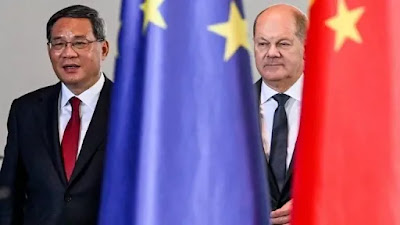Filenews 23 June 2023 - by Mixin Pei
When new Chinese leaders come to power, they carefully select the first foreign capitals they visit.
So Chinese Premier Li Qiang's current tour of Germany and France underscores how important improving ties with Europe, particularly its two most powerful countries, is for Beijing and President Xi Jinping.
The logic is obvious. While Xi has not written off hopes for stable relations with the United States, as evidenced by his meeting with U.S. Secretary of State Antony Blinken in Beijing this week, he knows that the issues separating the two superpowers are too big to bridge anytime soon.
Avoiding further escalation is perhaps the best he can hope for.
Fertile soil
Europe seems to offer more fertile ground. Despite the continent's growing hawkish attitude toward the Chinese factor, major European countries, including Germany and France, still do not see China as an existential threat to their security.
More importantly, they are not interested in being dragged into a U.S.-China cold war, let alone a hot war over Taiwan — a position most directly expressed by French President Emmanuel Macron.
Their economic interests in China are also far more important than those of the US in proportionate terms – thus presenting a clear opportunity that Beijing can seize.
Keeping Europe on the sidelines of the U.S.-China confrontation would greatly weaken Washington's power. From Xi's perspective, the recent convergence of views on both sides of the Atlantic on China is worrying.
Both the U.S. and the European Union have adopted the same mantra — "de-risking" — to advocate for cutting economic ties with Beijing.
Europe is not far from the US in terms of tighter control over technology exports and inward Chinese investment.
Even on the Taiwan issue — the issue most likely to anger China than any other — senior European officials have become more critical of Chinese behaviour and more supportive of the self-ruled island.
High price to pay
But persuading Europe to remain neutral, as Xi himself implicitly urged it, will not cost cheaply. Friendly rhetoric from officials like Lee and some sweet deals with European companies are not likely to be enough.
Serious economic disputes divide China and Europe, which has long complained of limited access to the Chinese market, Beijing's generous subsidies to its businesses and the Asian country's poor record in protecting intellectual property.
China will have to make a good-faith effort to address these concerns if it is to have any hope of maintaining its credibility with Europe.
European governments should also see much stronger action from China to combat climate change. In recent years, tensions with the U.S. and concerns about energy security have dampened China's ambitions on that front.
Xi didn't even attend COP26, a UN climate summit, in November 2021. Recent reports that China is building six times more coal-fired power plants than the rest of the world combined have drawn widespread condemnation.
Another issue about which Europe has strong feelings is China's poor human rights record.
While the U.S. often moderates its support for human rights abroad for geopolitical reasons, Europe has long taken a clearer approach, leading to frequent clashes with Beijing.
In 2021, the EU imposed sanctions on China over its ethnic repression in Xinjiang.
China's immediate counter-sanctions doomed the ratification of a landmark investment agreement just signed by China and the EU, which would have dealt a heavy blow to the US.
The knot of the Russian-Chinese front
Above all, European countries deeply resent China when it hides behind a façade of neutrality while continuing to support Vladimir Putin and his Russia.
If China does not back down on this support or play a truly constructive role in persuading Moscow to end the war in Ukraine on terms acceptable to Europe, Europeans will hold China at least partly responsible for the most serious threat to Europe's security since World War II.
It is inconceivable that China, at this stage, would leave Russia in exchange for good relations with Europe. For Beijing, Moscow is an irreplaceable partner in the Sino-American strategic competition.
China also has little room for manoeuvre in the field of human rights. Few Chinese leaders want to be seen as caving in to Western pressure and renouncing the Communist Party of China's zero-tolerance policy of political dissent over the past decade.
This leaves only trade and climate change as incentives for China to keep Europe out of the coalition that the US is building with remarkable success.
China would be wise to keep its expectations of success low. Some concessions on these two fronts would be better than nothing.
For its own reasons—particularly fear of fully pushing Xi into Putin's arms—Europe is unlikely to radically harden its policy toward China in the short term.
In the long run, however, the price for a strategic neutrality of Europe would likely be higher than China thinks — and probably greater than Xi is willing to pay.
